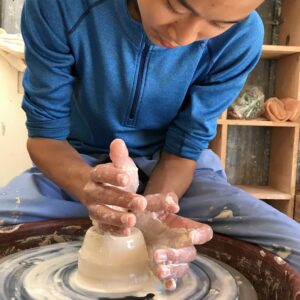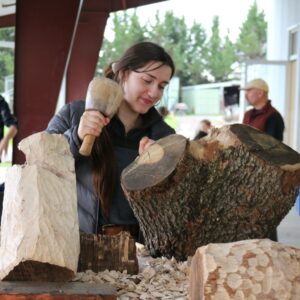How does working with our hands improve our brain function?
In the Psychology Today article, Susan Biali Haas, M.D. breaks it down for us:
- When we use our hands on a task that is not cognitively demanding, it gives the mind a chance to relax and rest.
- When [our brains are] “offline,” it gives [us] a chance to work on problems behind the scenes… it’s not uncommon for people to have breakthrough ideas while mindlessly working on something with their hands.
- When we engage in a repetitive task, completely taking our minds off whatever problem or issue we have been struggling with, the solution will often magically appear.
- Third, working productively with our hands is profoundly pleasurable. There is something primal about this. We are made to be active. And we have actively used our hands as part of our daily survival for thousands of years.
- With the advent of so much technology, many of us move through our days with minimal physical effort… we get far less physical activity than would be optimal for our bodies and minds.
- Using our hands may actually be key to maintaining a healthy mood. And the lack of this type of activity may contribute to feelings of irritability, apathy, and depression.
Working with our hands improves our cognitive function. It helps us come up with great ideas, brings us pleasure, increases our physical activity, and supports our mental wellbeing.
It really seems to hit every aspect of our health and wellness, so why aren’t we all doing it more?
At Summerfield, we are! This is central to our students’ education. Working with our hands is a huge part of the Waldorf curriculum, from kindergarten where children learn finger knitting, sewing, and woodworking, to 7th and 8th grade where students have at least 8 practical arts per year (wooden bowl carving, toolbox making, weaving, wet felting, clay work, stone carving, copper bowl smithing, basket weaving, perspective drawing, portraiture, pastels, and more!) This culminates in 12th grade where students paint their self-portrait in oil and sculpt a bust of themselves.
Using our hands to create and express ourselves develops problem solving, a sense of beauty, and self-confidence, and is an integral part of our curriculum.
Every grade at our school participates in handwork, art, music, eurythmy and other forms of movement, farming, and physician activities like games and the circus. These classes are in addition to our core academic classes like English, Math, Science, Geography, and History, where each of our students creates their own textbook or main lesson book. The work that our students do with their hands is expansive and occurs in each and every class.
Kelly Lambert wrote about this in her book, Lifting Depression: A Neuroscientist’s Hands-On Approach to Activating Your Brain’s Healing Power:
“What revs up the crucial effort-driven rewards circuit—the fuel, if you will—is generated by doing certain types of physical activities, especially ones that involve your hands. It’s important that these actions produce a result you can see, feel, and touch, such as knitting a sweater or tending a garden. Such actions and their associated thoughts, plans and ultimate results change the physiology and chemical makeup of the effort-driven rewards circuit, activating it in an energized way.”
Our students thrive at Summerfield, because we know this to be true. Our students are knitting, they are working in the garden, they are doing woodwork and blacksmithing. They get to do all of these during the day because we understand the importance of engagement at all levels: head, heart, and hands!
The next time you are feeling stressed or stuck, try doing something with your hands. It may be exactly what your brain and body need.




